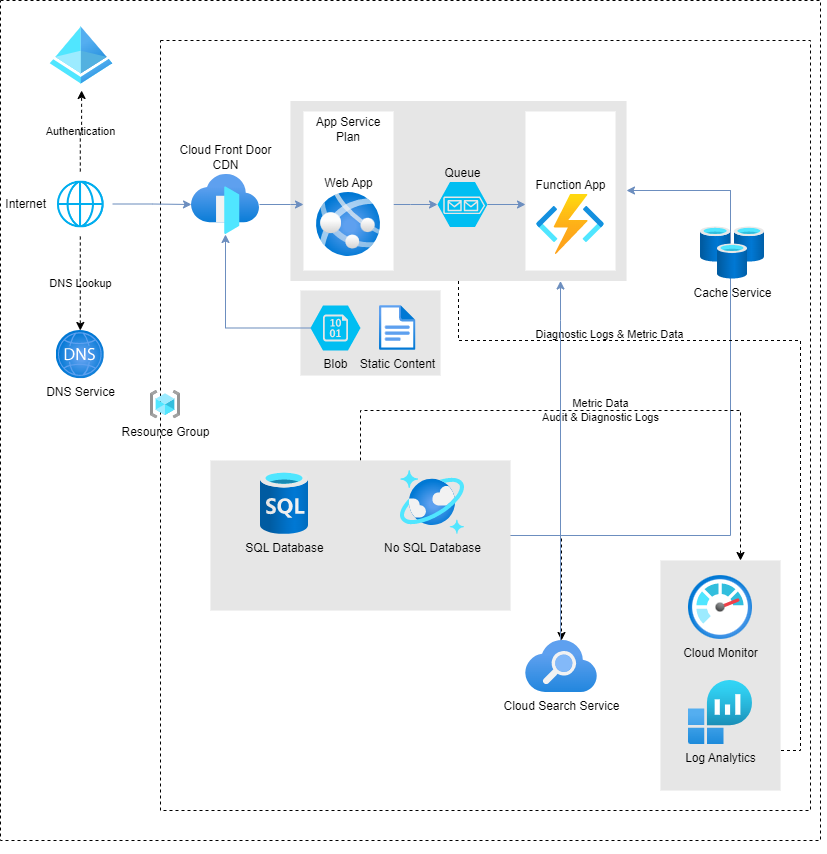☁️What is Cloud & Where it Lives?
Cloud Computing
What is Cloud?
We all know the cloud – it's that nebulous thing in the sky that the tech nerds talk about. But what is it, really? In a nutshell, the cloud is a network of servers that are connected together and allows you to access data from anywhere in the world. This means that you can store your files and data on a server somewhere else, and then access them from any device or computer that has internet access.
The term "cloud" refers to online services that allow users to access their files, applications, and data from any location.This means that you can access your Cloud files no matter where you are, whether you’re on your computer, your phone, or even on the go.
👇 As an example, the cloud application diagram below depicts a website portal application that has been deployed on the Azure cloud platform.
Where Do Cloud Live?
Are you wondering if the cloud actually lives in the sky? Is that what you're thinking? Well, let's find out.
"Cloud" is short for "cloud computing," which refers to the delivery of computing services over the internet. These services can include storage, servers, databases, software, analytics, and more. The term "cloud" comes from the idea that the internet is often represented as a cloud in diagrams and flowcharts, symbolizing how these services are accessible from anywhere, as long as there is an internet connection.
💡 Cloud services are provided by companies called cloud providers, which own and manage the required infrastructure, such as data centers, servers, and networking equipment. Some of the most well-known cloud providers are Amazon Web Services (AWS), Microsoft Azure, Google Cloud Platform, and IBM Cloud.
These cloud services "live" in data centers distributed across the globe. Data centers are large facilities that house thousands of servers, storage devices, and other equipment necessary to run cloud services. They are designed with robust security, cooling systems, and backup power supplies to ensure that the services remain available and reliable.
In summary, the "cloud" doesn't have a single physical location but rather is a collection of interconnected data centers and services that users can access via the internet.
Advantages and Disadvantages of Cloud
Cloud has many advantages, such as low cost, scalability, and flexibility, including the fact that it’s easy to access resources from anywhere and it’s cheaper than using traditional methods.
The cloud is also secure and reliable – meaning your data will be stored in a secure environment and won't be affected by any unauthorized users. The cloud is also scalable and flexible – meaning you can use it to store large amounts of data or to run multiple applications at once without running out of space.
🚨 The cloud can help you save money on hardware and software costs. By using the cloud, you can avoid having to buy expensive hardware or software outright, instead opting for subscription-based options where you pay for use of those resources on an as-needed basis.
Another great use for cloud computing is in cases where you need to scale up or down quickly. With cloud computing, you can easily add or remove servers as needed without having to worry about affecting other aspects of your application or site. Plus, if something goes wrong with one server – say it crashes – the rest of your site will still be operational thanks to the scalability features of cloud computing.
Cloud computing also offers flexibility when it comes to choosing which applications or services to use. You don't have to be locked into using a specific application or service – you can use any application or service that meets your needs. This means that if a new application or service becomes available, you don't have to worry about switching over from one platform to another – you can just switch over to the new platform.
However, there are also some disadvantages associated with cloud technology. For example, If the internet goes out during a storm or while you're traveling abroad without access to cellular service, then your site could crash due to lack of access to vital information stored on the Cloud Servers (e-mail etc).
And lastly - like anything else in life - there's always potential for vendor lock-in. When someone uses a particular platform or product provider exclusively (like Apple products), they may find it difficult switch over later on if they want something different (like Android devices). However, overall cloud technology has many great advantages which makes it worth considering for businesses and individual users alike!
Final Thought
Cloud computing can improve your business efficiency and save money, but you need to weigh the pros and cons carefully before deciding if it's right for you. Be sure to do your research and ask plenty of questions to ensure you're making the best decision for your company.
Hi, I’m Wajid Khan. I am trying to explain computer stuff in a simple and engaging manner, so that even non-techies can easily understand, and delivered to your inbox weekly.





